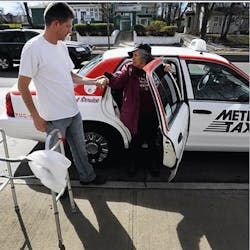Access-a-Cab service now offered solely by Denver RTD
The Denver Regional Transportation District (RTD) announced its Access-a-Cab paratransit service may see a change in service providers due to an increase to insurance policy limits that brings the program’s coverage consistency with RTD’s standard requirements.
Four companies have previously provided the public with Access-a-Cab service: Metro Taxi, Union Taxi, Green Taxi Cooperative and zTrip. As of Jan. 1, 2020, Denver RTD agreed to carry insurance with the new minimum coverage and will become the sole provider for Access-a-Cab. Denver RTD now provides about 78 percent of all Access-a-Cab service and, going forward, can offer coverage to the entirety of Denver RTD’s service district.
“We're confident that Metro Taxi will continue to provide the same level of service that previously was provided by all four companies,” said Paul Hamilton, senior manager of paratransit services. “RTD establishes requirements that providers need to follow to be our providers. Over the next two to three months, we will be working to seek relationships with additional providers for the Access-a-Cab program, to further expand on-demand choices for our paratransit customers.”
Denver RTD began offering Access-a-Cab in 1997 as a same-day alternative to Access-a-Ride, which provides public transportation to riders who have disabilities preventing them from using local fixed-route buses or light rail. Access-a-Cab is a regular cab service available to eligible Access-a-Ride patrons, with the passenger paying the first $2 of the fare, Denver RTD paying the next $12 and the passenger being responsible for any remaining amount. Access-a-Cab is used by customers for trips that are an average of three miles. Access-a-Ride, by comparison, carries passengers an average of 12.4 miles per trip and follows a different fare structure.
Of the nearly 19,000 current Access-a-Ride customers who can book trips on either service, just over 2,500 used Access-a-Cab during the past three months. About 100 individuals use Access-a-Cab at least five times a week, and about six people use it daily.
